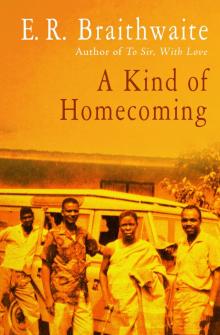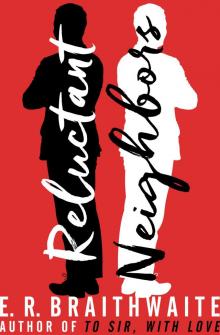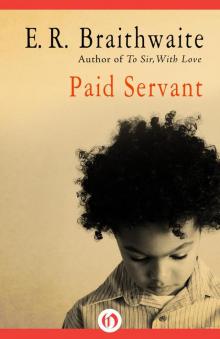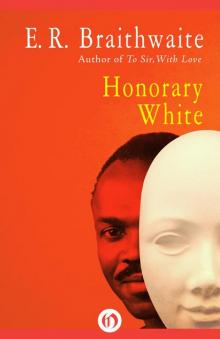- Home
- E. R. Braithwaite
A Kind of Homecoming
A Kind of Homecoming Read online
A Kind
of Homecoming
E. R. Braithwaite
Contents
Part One: Guinea
Part Two: Sierra Leone
Part Three: Liberia
Part Four: Ghana
Illustrations
About the Author
Part One
Guinea
TODAY, FEBRUARY 17, 1961, I set foot on African soil for the first time. I had expected and anticipated a spiritual excitement, a kind of dramatic consciousness of identity with the spirits of ancestors long dead and unknown, and I wished very hard to feel something, anything truly different after the long hours in the aeroplane. But all that happened was the heat, which soon had my shirt sticking to my back in the short walk from the plane to the airport lounge. Airport guards with rifles, or with pistols holstered at their sides, yet wearing friendly smiles and saluting the travellers with friendly gestures of welcome. The sky blue and clear and limitlessly empty except for the large wry-necked carrion crows which circled lazily, patiently confident that sooner or later they would find a meal.
The long ride to the hotel in Conakry, capital of the former French colony of Guinea, along a narrow asphalt road fringed with trees suddenly and sweetly familiar, the trees of boyhood and home-town. Coconut palms curving sinuously upward, their tufted tops swaying in disdainful majesty above the green banana and papaya trees. Mango trees, so deeply green each leaf seemed to be in shadow, breadfruit and laden orange trees. Here and there a clump of the sweet cassava plant, or the blooming hibiscus and bougainvillea. And now it came to me in a tear-starting rush. I had seen it all before in the British Guiana of my boyhood, all of it: the crows and the trees, and the low huts straw-thatched, with walls and floors of packed clay. As the car sped along the road I caught glimpses of familiar faces long remembered and I had the feeling that if I leaned out and called out a name, someone would answer with pleased recognition.
As I approached the centre of Conakry, the feeling of being in familiar surroundings decreased, probably because the buildings seemed so strange, square and shuttered. Ten-thirty in the morning and everywhere groups of people, sitting at doorways or outside the shops, or in the shade beside the road. Men, always the men sitting, dozing, or in friendly argument among themselves. Men talking and laughing while women moved among them with bundles or large household vessels balanced casually on their heads, and tiny children strapped straddle-legged on their backs.
In front of the shops the innumerable tailors, each one pedalling industriously on his treadle-type sewing-machine, undisturbed by the talk and laughter of the groups of men around them who had plenty of time to stand, stare and comment. And the others, those easily identifiable as strangers, always in groups of four or more, strong-featured men who reminded me of the drillers and surveyors and oilmen of Maracaibo, but without their easy banter and ribaldry. Russians, Czechs, and Chinese, all looking serious and dedicated as if determined to prove that they were not tourists.
I called at the bank to change some travellers cheques into the local currency, but finding it closed during the mid-day lunch period (not much lunch for the staff, I thought, for now is the time of Ramadan, the Moslem month of fasting), I wandered around and sat in the Bar St. Germain for a beer and sandwich. Nine Chinese, eight men and one woman, sat at a nearby table waiting to be served the lunch they ordered, meanwhile reading technical pamphlets and books, with hardly a single word exchanged between them. The waiter, a friendly little man originally from somewhere in the West Indies, noticed my interest in the Chinese group.
“We call them the miracle workers,” he said. “They build well and very quickly. Have you seen the Exposition Building?”
I replied that I didn’t know there was one.
“Nice,” he said, “very nice. And they build it like that—” and he snapped finger and thumb to indicate high speed.
The men were lean, hard-looking and young; the woman slim and petite, her hair severely short, her face impassive and without make-up. When the food arrived, they kept their books open and read while they ate, as if the food held little interest for them and was merely a necessary interruption in the flow of more positive endeavours.
Other people dropped into the bar and my friend the waiter would say “Russian” or “American”. One partly greying man approached my table, greeted me in French and sat down. He said he was a correspondent from Yugoslavia, in Guinea to cover the impending visit of Marshal Tito.
“Now I know why there are all the flags and street decorations,” I said.
“Well, partly,” he replied. “Most of them are left over from the visit of the Russian Premier, who was here a short while ago.”
I returned to the bank in the afternoon. The staff was just arriving and was busy shaking hands with each other in the French manner. The bank is a large building, the offices at street level. With several other customers, white and black, I waited at the counter while the staff showered each other with courtesies. They were all very young, and when they were finally seated at their desks and had begun their various activities, they seemed very slow and inexperienced. Typewriters and adding machines were operated slowly and ponderously, and I had the feeling that they were all in training, if not completely new to the job. When finally a clerk approached me, he took what seemed to be an awfully long time to complete several forms. Then I was told to sit and wait, so I stood at a barred window and watched the movement in the street outside.
People spitting all over the place, so with some disgust I turned away.
“Awful, isn’t it?”
A man was standing beside me. He too must have been watching the people.
“I mean the spitting,” he went on. “But there’s a reason for it. They’re fasting, most of them, and what with the heat and the dust, it is very difficult to swallow the saliva, so they spit; same thing in all Moslem countries. Try fasting and you might feel yourself wanting to spit too.”
He was tall and thin and very red, as if new to the heat and strong sunshine. He spoke in English, each word clearly and carefully enunciated, as is the case when one is using a foreign language. His thin, bony face had a sharp, intelligent look, but pleasant with curiosity and understanding.
“It must be difficult for them in this heat,” I replied, not knowing what else to say.
“They’re accustomed to it,” he said. “It’s one of the things that bind these people together, their religion, and helps to rally them for political action when necessary. Which part of Africa you from?”
“I’m from the West Indies,” I answered, “and I am visiting Africa for the first time to take a look at things.”
“I come from Prague,” he told me. “I’m a teacher. I am here helping to train teachers.”
So we talked about teaching. I mentioned that I had taught in schools in Britain, and referred to the kind of problems I had encountered there.
In Guinea, he said, there was never any problem of discipline because religious and other influences conditioned the child to respect his elders, and the educated person commanded a position of prestige. The main problem was how best to meet the acute shortage of schools, teaching staff and equipment, and at the same time keep pace with the hunger for education which was everywhere in evidence. As I spoke with him I realized that he had a real and simple belief in human dignity, and his work was important in that it was geared to a readiness to be sympathetic and helpful.
I noticed that while talking, the time had slipped away and we were still waiting for our money, so I approached the clerk who had attended me and asked if there was any reason for the delay.
“Everythin
g is ready,” he replied, “but the cashier has not yet returned from lunch.”
He was very matter-of-fact about it, and I felt myself becoming impatient and irritable, especially as the clerk casually ignored me and went on laboriously adding figures on a machine.
The Czech teacher said, “This is not Paris or London, you know. After all, there’s nowhere to go in a hurry, so don’t be too impatient. These young people are trying to do a very complicated job without much experience. When the French left, they took every piece of equipment they could with them, together with the experienced staff, so these young men and women have to learn as they go, and banking is not the easiest of business transactions. Nevertheless, they are making it work, no matter how slow it seems. As they become more and more accustomed to the routine of the work and the techniques of international finance, the whole thing will speed up. And here’s something else. When it is finally running smoothly, all these young people will have the satisfaction of knowing that they did it themselves—that’s important, you know.”
Soon afterwards the cashier arrived, a good-looking, obviously pregnant young woman. She quickly checked through the forms, made some rapid calculations on a small adding machine and paid me the amount I required in Guinea currency. From the speed with which she worked in such contrast to her colleagues, it was clear that she was very experienced, and, pregnant though she was, very much needed.
Once out in the street the Czech teacher remarked, “That’s a sign of the times. All the white faces were on the wrong side of the counter.”
I understood his little joke.
When I left him I wandered away from the centre of town through the narrow streets lined with the all-purpose shops of the Lebanese traders, past a high wall behind which could be heard the all-too-familiar sounds of children’s voices. I followed the wall round to a wooden gateway and entered a small courtyard where about a hundred children sat in tight rows behind long, narrow, trestle-type desks and repeated the instructions of a teacher as he explained simple arithmetical tables with the assistance of a blackboard. I paused, but he noticed me and came over.
I apologized for interrupting his lesson but he seemed quite pleased to have a visitor, especially when I mentioned that I too had been a teacher. As soon as the children saw me they all stood up very quietly, a gesture of respect I had received previously only in the public schools of Britain, and it occurred to me that whatever the shortages in other fields, this new State was not ignoring the importance of social niceties. The class was mixed, boys and girls of about eleven years, all simply, sometimes poorly, dressed, without any attention to uniformity, but their black faces and lively eyes shone with their hunger for knowledge and information. The teacher wore khaki slacks and shirt, and simple sandals of broad strips of leather fastened to thick rubber soles which I suspected had been cut from old motor-car tyres. On his brown intelligent face he sported a sparse, scraggly beard which did nothing for him, nor took anything from him—it was simply there, that’s all. His French was beautifully articulated, and I later discovered that he had studied for eleven years in Dakar.
“Are you over here to help us, as a teacher?” he asked.
“Oh, no,” I replied. “I’m merely wandering around Africa looking for things to write about. My first visit, you know.”
“Welcome again,” he said, and we shook hands again. “But it’s a pity you’re not a teacher. We desperately need all we can get. See for yourself. I need at least another teacher to help me here.”
“Any likelihood of the situation improving?”
“Oh, we’re getting help,” he replied, “but not enough quickly enough. People are coming to help us from China and Czechoslovakia and Yugoslavia, and the West Indies. You know, Martinique and Guadeloupe, where they speak French. Sometimes it even becomes a bit complicated when some of the new teachers have to teach through interpreters until they can manage in French. Damned funny at times.” His laugh was easy and pleasant.
“I suppose that limits the scope of the teaching you are able to do,” I suggested.
“Not too much,” he replied, “because we are adapting our educational plans to our needs, and right now we need artisans and agricultural workers more than we need clerks and potential bureaucrats. So we are concentrating on primary education to supply a broad general base, then in the secondary schools we are providing technical education planned to create an interest in the country and a willingness to contribute to its development. The child who gets an education must appreciate that the State needs his trained usefulness.”
“You mentioned teachers from China, Czechoslovakia, etc.,” I said. “Do they not present the possible danger of introducing communistic ideas into the minds of the youngsters?”
Immediately his face lost its pleasant, friendly mien; his eyes shone with controlled anger and he replied, “You Americans are all alike. Black or white, you’re all the same.”
In a hasty attempt at apology I said, “I’m sorry. I did not mean to offend you by asking that question. Incidentally, I’m not an American, I’m a West Indian. Please forgive me if my question annoyed you.”
“I’m not annoyed,” he said, carefully. “I’m merely sorry for you, because you Americans have developed such a phobia about the word ‘Communist’ that you see nothing but Communists wherever you go. Here in Guinea we are desperately trying to transform independence from a political attainment into an economic reality. To do that we need help, and we are not too proud to accept help, but we will not accept any help if it means jeopardizing any part or aspect of that independence we sacrificed so much to achieve.”
I looked at the children and noticed that they were watching somewhat anxiously. Something of the teacher’s changed mood must have transmitted itself very quickly to them and they were in silent response to it. The teacher himself seemed suddenly aware of the children’s interest, because he turned and rapidly wrote a few simple problems on the blackboard which he instructed them to copy and solve in their notebooks. When they were busy at this he turned once more to me.
“Maybe you Americans would like to help us, if,” he emphasized that little word with hands and shoulders and eyes—it even had a strangely sibilant sound as he hissed it at me. “Maybe you would help us, but only on your terms, because you neither understand nor believe in African neutrality, and that is simply explained by the fact that, as yet, you do not believe or respect Africans.” He paused and shrugged, a tired, patient gesture. “I am not a Communist; I’m merely a teacher trying to do my job as well as I am able. This is not a Communist country and I think I can safely say it never will be. The day you black Americans understand what personal independence really means, you will begin to understand how we feel about our country.”
He was not angry. But I was becoming bored with being called an American and being blamed for their supposed sins of omission. I made one more try.
“I’m not an American, I’m from the West Indies.”
“Oh, yes, so you said,” he answered, smiling suddenly. “But you sound like an American. You ought to stay here a while and become—what is the term?—‘brain-washed’.” He laughed at this and I joined him, and on that easier note I left him.
The afternoon sun was very warm and I made my way in the general direction back to my hotel, anticipating a refreshing shower and a change from my sweat-damp clothes. Here and there I saw groups of workmen swarming over the skeleton of a new building, and it was with something of a shock that I realized that nowhere in sight was there a single piece of mechanical equipment—everything was being done by hand. Ladders were makeshift arrangements from roughly cut saplings, as were all other wooden supports in use; concrete was mixed by hand and passed by a chain of hands to the place desired. Here and there I saw a European directing operations, and I guessed from their Slavic features that they were Eastern European. But in spite of what the young Guinea teacher had just said,
there was not much evidence of concentrated popular effort. In fact, Conakry was, to me, singularly depressing.
Back at the hotel I tried, without success, to obtain a newspaper: the desk-clerk informed me that there were no newspapers in Guinea nowadays. “We’re putting first things first,” he said, “and at the moment we cannot afford either the money or the time necessary to run a newspaper. Each day the Department of Information puts out a news bulletin, and we find that it is enough for our needs.”
Later, however, I found a two-week-old copy of The Guardian in a drawer of the wardrobe. It was the first time I can remember reading a newspaper so thoroughly. After a shower and change of clothing, I sat in the lounge of the hotel drinking canned pineapple juice, looking out across the wide expanse of rocky, muddy beach, crudely exposed by the receding tide, and wondering how long it would be before I could get my face into some real, fresh, African, ripened-on-the-tree fruit as a change from the tinned variety which I was drinking.
Around six o’clock in the evening I decided to take another stroll around town, but this time I’d wear slacks and sports shirt, and be as much as possible like the local people. “After all,” I thought, “I look as African as any of them, and it should not be too difficult for me to fade into the general background.” So, suitably dressed, or so I thought, I set out, and was soon mingling with the groups which moved about the now-shady streets. But time and again people would look at me, and smiling, greet me, “Bon soir, Monsieur, ça va?” and I would reply with “Bon soir, ça va bien.” There was no mistaking the fact that they knew I was a stranger.
I stopped outside a tiny wooden shop where some young men were industriously carving animal and human figures from ivory tusks, under the watchful eye of a bald ancient with the long neck and narrow head of a Mandingo tribesman. I was fascinated by their deft, sure application to their craft, now grossly commercialized to meet the increasing demands of tourists from many countries. Twin female figures delicately carved from small brown tusks caught my attention and I inquired of one of the young men “Combien?”

 A Kind of Homecoming
A Kind of Homecoming Reluctant Neighbors
Reluctant Neighbors Paid Servant
Paid Servant Billingsly
Billingsly Honorary White
Honorary White To Sir With Love
To Sir With Love Choice of Straws
Choice of Straws